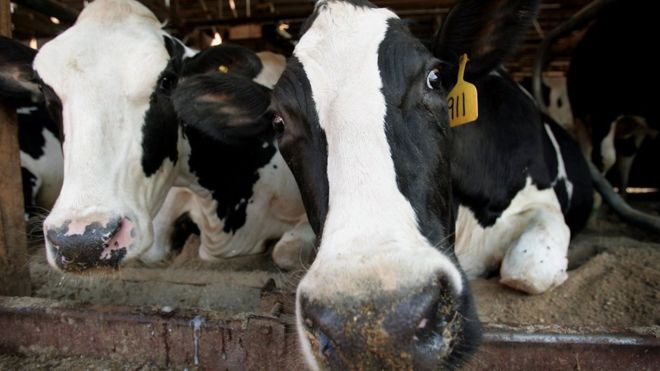
The Scott administration will ask the Legislature to approve about $400 million in economic relief for several business sectors that have been hit hard since businesses started closing down in March to suppress the spread of the coronavirus.
Gov. Phil Scott outlined the proposed spending plan, which is divided into two phases, on Wednesday at his three-times-a-week Covid-19 press conference. The proposal includes $40 million for dairy farms and $10 million for processors such as cheesemakers.
Anson Tebbetts, secretary of the Agency of Agriculture, described the grants for dairy farmers as “a matter of survival” and said their markets had collapsed overnight as restaurants, schools and coffee shops closed.
“The dairy farmer and those who make cheese, butter, yogurt, ice cream and milk face an uncertain future,” Tebbetts said. Farmers had already struggled to pay their bills after five years of record-low milk prices, which were slowly starting to rebound when the pandemic hit early this year. Vermont has lost more than 400 dairy farms in the last decade.
Also at risk are businesses that work with farmers, such as feed and seed dealers, veterinarians, and the people who work for farmers and processors.
“The financial impact has already hit farm families,” said Tebbetts. “The forecast is dismal for June, July, August, with estimated milk prices hitting historic lows.” Vermont cheesemakers have reported losses from 50% to 95%, he said. “Markets have dried up practically overnight in New York, Boston, and Washington in spots where Vermont cheese was on the menu.”
Vermont dairy farms are expected to report losses of $42 million over the first three months of the economic shutdown, said Amanda St. Pierre, the executive director of the Vermont Dairy Producers Association. The group worked with state officials to come up with the grants programs for dairy farmers. The association represents about 120 dairy farms as well as equipment, seed and other companies that serve dairy farms.
St. Pierre said things had started turning around for dairy farmers last year. While many are retiring, they were finding people to pass their businesses to, she said.
“Pre-Covid, the markets looked great,” she said Wednesday. “We were all very hopeful, working hard over the last four, five years to make our farms more sustainable, to diversify, to make business plans. All that was great and then this pandemic hit.”
In March and April, dairy farmers across the country, including in Vermont, dumped milk as a result of the drop in demand and on instruction from their dairy cooperatives. The Agency of Agriculture has since worked with the Vermont Community Foundation, Commonwealth Dairy, Hood and Dairy Farmers of America – which bought the St. Albans Cooperative last year – on a program that had the milk turned into yogurt and cheese and donated to the Vermont Foodbank.
Vermont agriculture officials – along with agriculture officials in other states — are also asking the USDA to set a minimum milk price that reflects the price of production in the Northeast.
Tebbetts said there are 670 dairy farms and 140 milk processors in Vermont. He said the Agency of Agriculture has also worked during the crisis to get Vermont dairy products into some of the larger retail chains.
“We’ve established some relationships that weren’t there before between Vermont farmers and some of those larger retailers,” he said.
If the relief proposal is approved by lawmakers, farmers will be able to apply for grants through the Agency of Agriculture.
Vermont dairy farms are supported by an array of state programs aimed at keeping Vermont’s landscape open and protecting a way of life that is seen as essential to the state’s character and communities. But state assistance isn’t always enough to make dairy farming viable, and the state lost nearly 50 farms last year alone. The topic of farm diversification and survival is a popular one at dairy conferences and meetings.
Asked by a reporter if it continues to make sense to direct public money to dairy farming, Scott said that it does.
“Every crisis spurs innovation and creativity and the necessity to do things differently,” he said. “We learned that during (Tropical Storm) Irene and we’re certainly going to learn that in this crisis as well. We should look at this as an opportunity to be better, stronger, and do things differently in order for us to survive in the future.”























